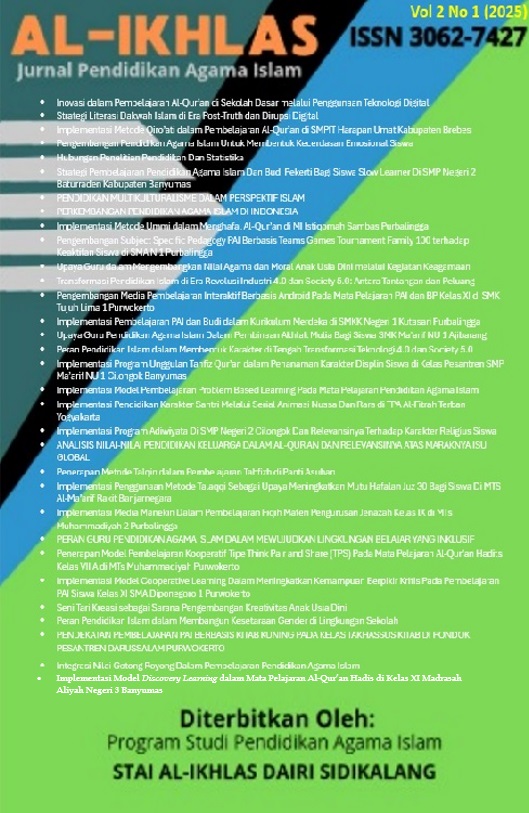Implementasi Model Discovery Learning dalam Mata Pelajaran Al-Qur’an Hadis di Kelas XI Madrasah Aliyah Negeri 3 Banyumas
Keywords:
Learning innovationAbstract
The learning of Al-Qur’an and Hadith plays an essential role in shaping students' understanding of the Qur’anic and Hadith content within the school environment. This learning process presents unique challenges for educators, as it is not only aimed at transmitting religious knowledge but also at cultivating moral values, ethics, and spirituality in students’ daily lives, as reflected in the teachings of the Qur’an and hadith. One common issue is the low level of active student participation during the learning process and the difficulty teachers face in fostering learning motivation. As an alternative solution, an active learning approach through the discovery learning model can be implemented. This model provides students with the opportunity to be directly involved in the exploration, discovery, and observation of subject matter. Thus, learners become active participants in the learning process and gain a deeper understanding of content derived from the Qur’an and Hadith.This study aims to analyze the implementation of the discovery learning model in Al-Qur’an hadith instruction at MAN 3 Banyumas. The method used is a qualitative approach through a case study with field research design. The study was conducted at MAN 3 Banyumas, Sumpiuh District. Data collection techniques included observation, interviews, and documentation. The collected data were analyzed through data reduction, data display, and conclusion drawing. To ensure data validity, triangulation techniques were applied. The results showed that the application of the discovery learning model in Al-Qur’an Hadith learning was generally carried out in two main stages: implementation and evaluation. The implementation phase consists of three learning activities introductory, core, and closing activities while the evaluation phase was conducted using both test and non-test instruments
Downloads
References
Fadli, M. R. (2021). Memahami desain metode penelitian kualitatif. HUMANIKA, 21(1), 33–54. https://doi.org/10.21831/hum.v21i1.38075
Iwantoro, I., Rahmat, S., & Haris, A. (2022). Discovery Learning sebagai Inovasi Model Pembelajaran Pendidikan Agama Islam Pasca Pandemi Covid-19. JIE (Journal of Islamic Education), 7(2), 154. https://doi.org/https://doi.org/10.52615/jie.v7i2.275
Masnu’ah, S. (2022). Analisis Kebijakan Pendidikan Islam dalam Undang-undang No 20 Tahun 2003 (SISDIKNAS). MODELING: Jurnal Program Studi PGMI, 9(1), 115–130.
Nasution, A. F. (2023). Metode Penelitian Kualitatif.
Rahayuningsih, S. H., Asrowi, Gunarhadi, & Ramli, M. (2024). Meta-Analysis Effectiveness of Using the Discovery Learning Model on Students’ 21st-Century Critical Thinking Skills. Jurnal Penelitian Pendidikan IPA, 10(10), 685–692. https://doi.org/10.29303/jppipa.v10i10.8961
Rahmawati, E., & Rahayu, G. D. S. (2021). Implementasi Model Discovery Learning Berbasis Media Gambar Dalam Meningkatkan Kecerdasan Ekologis Siswa Sekolah Dasar. Journal of Elementary Education, 04(02), 242. https://doi.org/https://doi.org/10.22460/collase.v4i2.5155
Romadloni, N. (2023). Model Pembelajaran Problem Based Learning Dalam Upaya Meningkatkan Motivasi Belajar Siswa Pada Pelajaran Matematika Materi. Anterior Jurnal, 2(1), 27–36. https://journal.muntahanoorinstitute.com/index.php/al-nizam/article/view/122
Rosni, R. (2021). Kompetensi guru dalam meningkatkan mutu pembelajaran di sekolah dasar. Jurnal EDUCATIO: Jurnal Pendidikan Indonesia, 7(2), 113. https://doi.org/10.29210/1202121176
Sekarsari, F. D. F. P., Wicaksono, A. G., & Sarafuddin. (2023). Analisis Model Pembelajaran Discovery Learning Pada Pembelajaran Matematika Sekolah Dasar. Journal of Educational Learning and Innovation (ELIa), 3(1), 213–225. https://doi.org/https://doi.org/10.46229/elia.v3i1.648
Widari, N. A. (2023). Model Pembelajaran Discovery Learning Untuk Meningkatkan Partisipasi Aktif Peserta Didik Dalam Pembelajaran Bahasa Indonesia. 1–12. https://doi.org/10.31219/osf.io/yr8mp
Yadav, D. (2022). Criteria for Good Qualitative Research: A Comprehensive Review. The Asia-Pacific Education Researcher, 31(6), 679–689. https://doi.org/10.1007/s40299-021-00619-0

Downloads
Published
Versions
- 17-07-2025 (3)
- 17-07-2025 (2)
- 17-07-2025 (1)
How to Cite
Issue
Section
License
Copyright (c) 2025 Maulana Hidayat, Muhammad Nurhalim

This work is licensed under a Creative Commons Attribution-NonCommercial-ShareAlike 4.0 International License.










